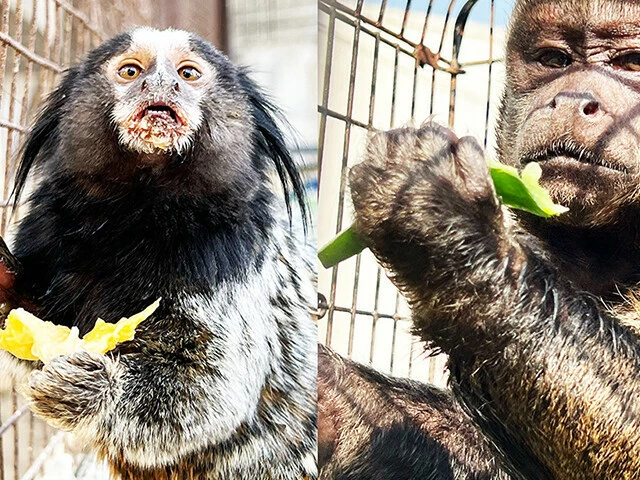Wildlife dept opposes relocation of seized exotic monkeys to Lahore
26 Capuchins and Marmosets were confiscated after being illegally imported from South Africa

The Sindh Wildlife Department has formally opposed the proposed relocation of 26 exotic monkeys — Capuchins and Marmosets — from Karachi to Lahore, urging the Ministry of Climate Change (MoCC) to reconsider its directive issued on May 8, 2025.
The department has called for adherence to legal protocols and scientific standards in dealing with the animals, which were seized in December 2024 at Jinnah international airport, after being illegally imported from South Africa using forged documents.
The monkeys were confiscated by Pakistan Customs in violation of both national and international wildlife laws. Following the seizure, the animals were placed in the care of the Ayesha Chundrigar Foundation (ACF), a private animal welfare facility, on an emergency basis.
Despite the matter being sub judice before a competent Customs court, the deputy conservator of wildlife, Ministry of Climate Change in Islamabad, directed the animals be transferred to a facility in Lahore. The Sindh Wildlife Department has raised serious concerns over the legality of this directive, warning that such action — without court approval — could compromise judicial proceedings and violate procedural integrity.
In April 2025, the Sindh chief secretary convened a high-level virtual meeting to address the issue. Attendees included representatives from the Ministry of Climate Change, Pakistan Customs, Sindh Wildlife Department, WWF-Pakistan, and other key stakeholders. Subsequently, a technical committee was constituted by the federal secretary MoCC to assess the case and provide evidence-based recommendations grounded in law, science, and animal welfare.
The joint report submitted by the Sindh Wildlife Department and WWF-Pakistan concluded that relocating the primates to Lahore would be detrimental to their health and welfare. It stressed that such a move would contradict legal standards and sound scientific practices. The report pointed out that the proposed Lahore facility lacks the species-specific infrastructure and expertise required to care for tropical primates, citing previous failures in hygiene, veterinary care, behavioral enrichment, and animal welfare.
Despite these findings, the Ministry of Climate Change issued a recommendation on May 8 for the transfer of the animals to Lahore — without consulting the constituted committee or reviewing its report. The Sindh Wildlife Department, in its formal response, expressed concern over the ministry’s unilateral action and the absence of any communication with the trial court where the matter is currently under legal scrutiny.
The department stated that all wildlife found within Sindh’s territorial jurisdiction is protected under Section 21 of the Sindh Wildlife Protection Act, 2020. Moreover, Rule 43 of the Sindh Wildlife Protection Rules, 2022, places the legal onus on airlines or transport operators involved in illegal wildlife importation to facilitate either deportation or lawful disposal, based on the wildlife officer’s recommendation.
From a scientific standpoint, the department strongly objected to relocating the monkeys, which are highly sensitive New World primates adapted to stable tropical climates. Capuchins and Marmosets require specific environmental conditions, including temperature regulation, enriched enclosures, social groupings, specialized diets, and experienced veterinary care—resources currently lacking at the Lahore facility.
A senior official from the Sindh Wildlife Department urged the Ministry of Climate Change to revisit the findings of the technical committee and to reconvene the multi-stakeholder forum before making any final decision.




















COMMENTS
Comments are moderated and generally will be posted if they are on-topic and not abusive.
For more information, please see our Comments FAQ